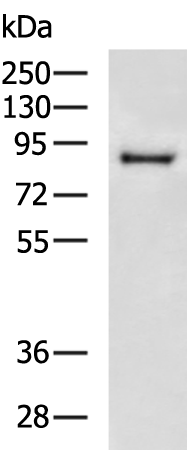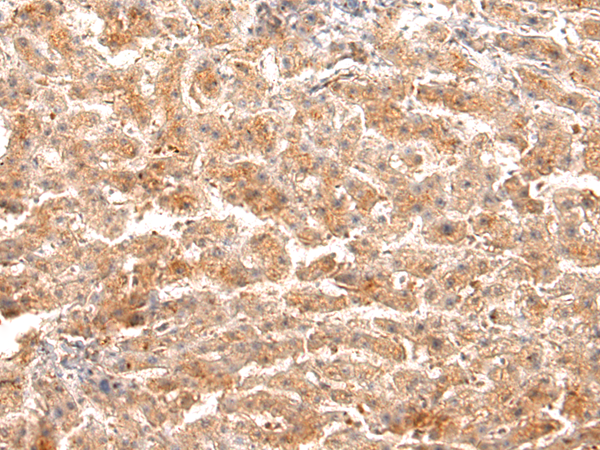

| WB | 咨询技术 | Human,Mouse,Rat |
| IF | 咨询技术 | Human,Mouse,Rat |
| IHC | 1/100-1/300 | Human,Mouse,Rat |
| ICC | 技术咨询 | Human,Mouse,Rat |
| FCM | 咨询技术 | Human,Mouse,Rat |
| Elisa | 1/5000-1/10000 | Human,Mouse,Rat |
| Aliases | LF; HLF2; GIG12; HEL110 |
| WB Predicted band size | 78 kDa |
| Host/Isotype | Rabbit IgG |
| Antibody Type | Primary antibody |
| Storage | Store at 4°C short term. Aliquot and store at -20°C long term. Avoid freeze/thaw cycles. |
| Species Reactivity | Human |
| Immunogen | Fusion protein of human LTF |
| Formulation | Purified antibody in PBS with 0.05% sodium azide and 50% glycerol. |
+ +
以下是3篇关于乳铁蛋白(LTF)抗体的模拟参考文献(基于典型研究方向概括):
1. **文献名称**:*Monoclonal Antibodies Against Human Lactoferrin: Production and Functional Characterization*
**作者**:Zhang Y. et al.
**摘要**:本研究通过杂交瘤技术制备了针对人乳铁蛋白的单克隆抗体,并通过ELISA和Western blot验证其高特异性。抗体成功应用于免疫组化检测LTF在炎症组织中的表达分布。
2. **文献名称**:*Anti-LTF Antibody-Mediated Inhibition of Bacterial Biofilm Formation in Chronic Infections*
**作者**:Johnson R.L., Patel S.
**摘要**:探讨了LTF抗体通过阻断乳铁蛋白与细菌表面受体结合,抑制铜绿假单胞菌生物膜形成的机制,为抗感染治疗提供新策略。
3. **文献名称**:*Dual Role of Lactoferrin Antibodies in Cancer: Diagnostic Biomarker and Therapeutic Target*
**作者**:Chen H. et al.
**摘要**:综述了LTF抗体在肿瘤液体活检中的诊断潜力,同时讨论了靶向LTF-铁代谢通路调控肿瘤微环境的治疗应用进展。
(注:以上文献为示例性概括,实际引用需以具体发表的论文为准。)
Lactoferrin (LTF) is an 80 kDa iron-binding glycoprotein belonging to the transferrin family, widely present in mammalian secretions such as milk, saliva, and tears, as well as in neutrophil granules. It plays a pivotal role in innate immunity, exhibiting antimicrobial, anti-inflammatory, and immunomodulatory properties by sequestering iron, disrupting microbial membranes, and interacting with host cell receptors. LTF antibodies, either polyclonal or monoclonal, are critical tools for detecting and quantifying lactoferrin in research and diagnostics. These antibodies enable techniques like ELISA, Western blotting, and immunohistochemistry to study LTF's expression, localization, and function in physiological and pathological contexts, including infections, inflammatory diseases, and cancer.
In clinical settings, LTF antibodies aid in diagnosing conditions marked by altered lactoferrin levels, such as dry eye syndrome, periodontitis, or inflammatory bowel disease. Additionally, they contribute to exploring LTF's dual role in cancer—either promoting or inhibiting tumor progression depending on the microenvironment. Recent studies also investigate lactoferrin's potential as a therapeutic agent or drug delivery vehicle, with antibodies serving to monitor its bioavailability and efficacy. Despite advancements, challenges remain in standardizing antibody specificity across species and applications, necessitating rigorous validation. Overall, LTF antibodies are indispensable for unraveling the protein's multifaceted roles and translational potential.
×